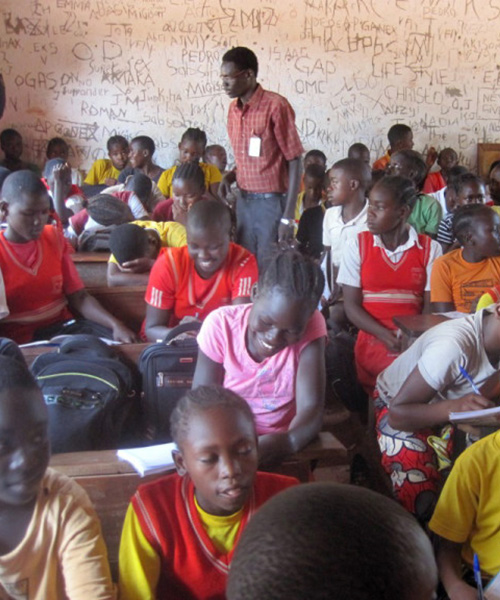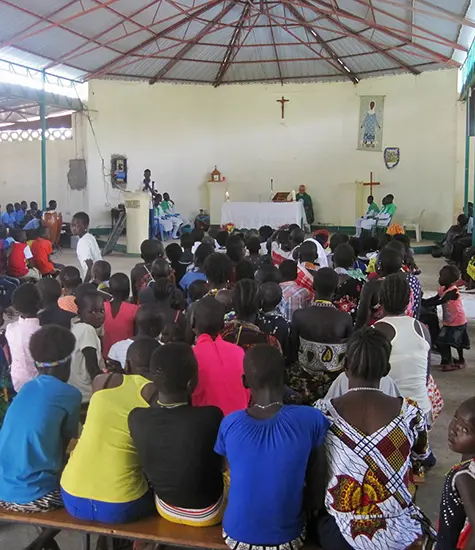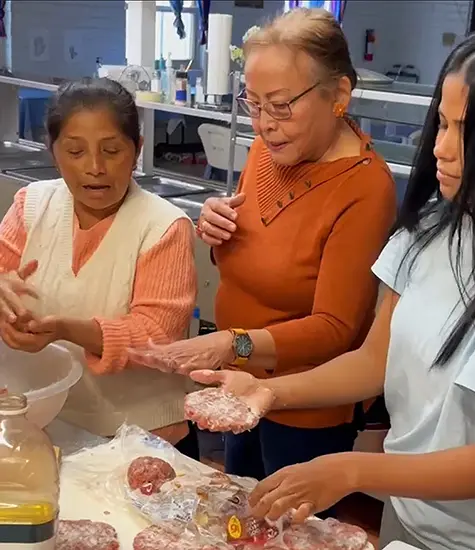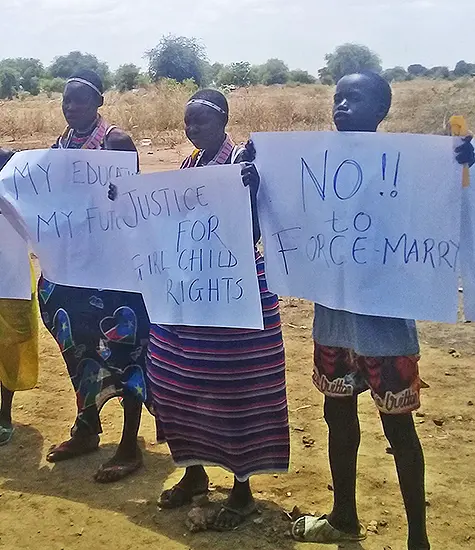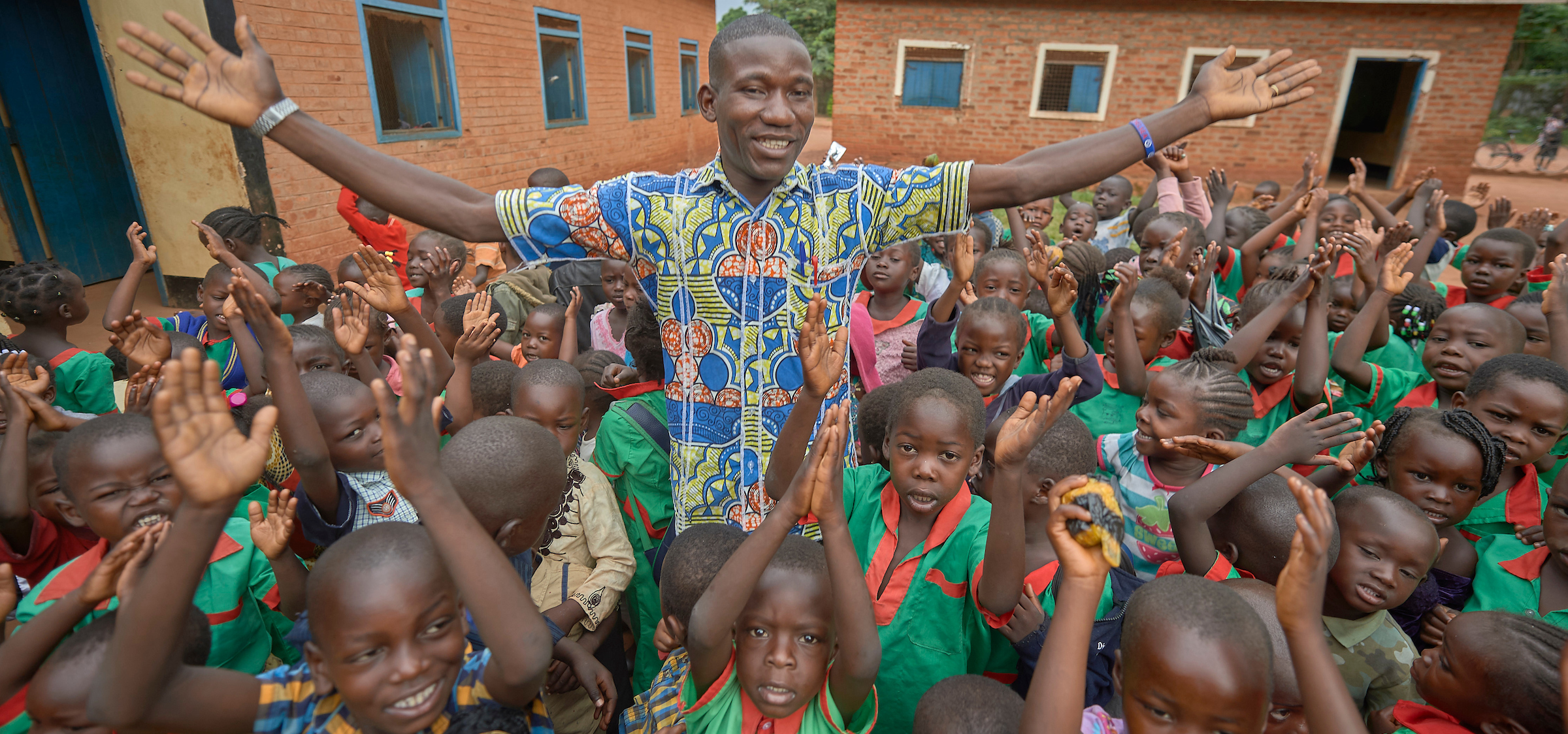
Victor Hume, a graduate of the Solidarity Teacher Training College (STTC) in Yambio, South Sudan, sings a song with his students in the Catholic Church-sponsored Abangite Nursery School in Yambio. At STTC, Maryknoll lay missioner Gabe Hurrish helps to prepare teachers for a very challenging career. Photo by Paul Jeffrey.
According to report issued by the United Nations in February 2019, South Sudan has the highest proportion of out-of-school children in the world. There are more than 2.2 million school-aged children in South Sudan who are not attending classes. Either no schools exist or the children are too poor or there is no feeling that education is important.
Many children in South Sudan have to walk up to two hours to reach a school. If it rains, if the road or pathways are insecure, if they are sick or anyone in their family is sick, they can’t go. Many of the teachers don’t show up because they don’t get paid, are volunteers or are sick themselves. Upon arriving, children may be told “no school today” so they walk back slowly because as soon as they arrive home, hard work on the farm or in the house awaits them.
Lack of government support and isolation of many of these communities leads the community to start their own rudimentary schools. Schools have no decent classrooms forcing students to study in dilapidated buildings. In the most remote and underdeveloped areas classes are held under trees. They sit on rocks, logs, or any other object. One student had a classroom but no roof or windows, just four walls.
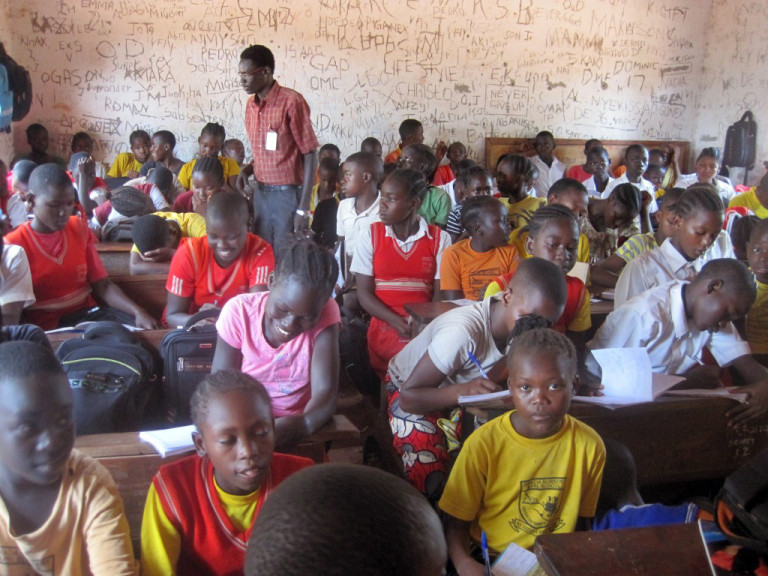
Crowded classrooms are common in South Sudan. Photo by Gabe Hurrish.
Most teachers are volunteers who have little or no education themselves. They are not paid any salary and rely upon their own farms and harvests for income and sustenance.
One student told me that one particular teacher he had in first grade would simply write one letter of the alphabet on the board and send the students home to study this letter the rest of the day. That took 26 days! Hardly encouraging lessons for anyone keen to learn.
We know that lousy English speakers are teaching lousy English to their students. We know that caning is the preferred choice of school punishment—even when not deserved.
Due to lack of resources, the untrained teachers have to improvise. They often have to use wood or cardboard as black boards, and the chalk is a piece of homemade charcoal. Since there are no books, pens, desks or chairs, the students write their assignments in the dust at their feet, and the teacher walks around and checks it.
Here at Solidarity Teacher Training College (STTC) in Yambio, where I work, we actually have several students in their 20s who prefer to write on their laps as they are so used to it that writing on a desk seems awkward to them.
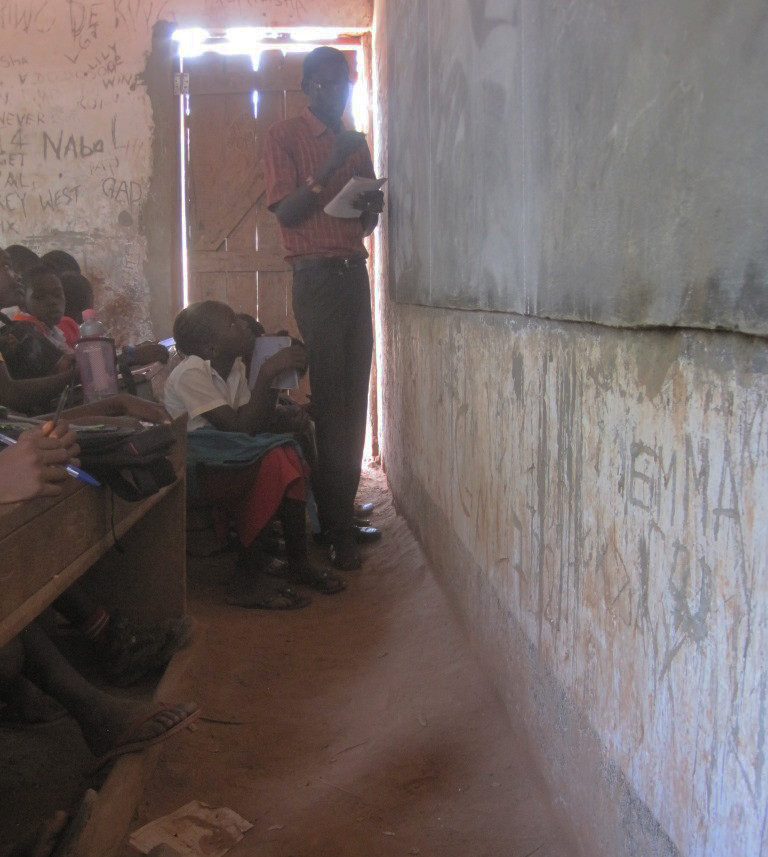
Some classrooms are so crowded that there is no room for the teacher. Photo by Gabe Hurrish.
In the Nuba Mountains, a mostly unknown civil war continues. North Sudan has planes that drop bombs indiscriminately. One STTC student told me of bombs killing his friends in primary school while they were under a tree. By the grace of God, he happened to be in the broken-down brick building with no windows or roof which was just enough to protect them from the shrapnel that was propelled around the schoolyard. The carnage was immense. He has been permanently traumatised by this incident 12 years ago and told me the story with some difficulty. To this day, North Sudan continues to drop bombs indiscriminately, and several have even landed in United Nations protection camps.
If the families can afford private schools or are lucky enough to be enrolled in a mission school, most of the teachers are from Kenya or Uganda. They are not very skilled, and even though it is illegal, beating students for poor performance or behavior is common. It is so common, in fact, that one of our student teachers reported that the children in a particular school actually wanted to be caned because they felt that was what they needed, that it was “normal.” Our school teaches differently.
And so what is the good news? Well, the good news is that Solidarity Teacher Training College is graduating between 20 to 30 newly qualified and trained teachers every four months. These are the young, sharp minds that will be working with the youth of tomorrow. They are the future, and God willing, they will be the agents of change. But they have a colossal challenge ahead of them.
One of the STTC students was told that becoming a teacher in South Sudan is like signing your name in the book of poverty. Teachers in South Sudan can be paid as little as $1.50 per week and there really is no incentive to put much effort into teaching. They must tend a family crop or start a business to help their families survive.
Teaching in South Sudan is a very challenging profession—with incredible obstacles and difficulties to overcome.
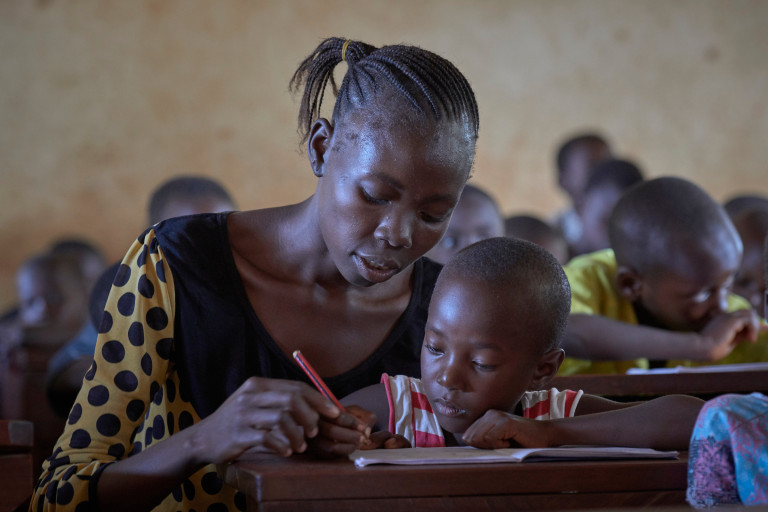
Joana Ilario, a graduate of the Solidarity Teacher Training College, helps one of her students at St. Mary’s Primary School in Yambio. Photo by Paul Jeffrey
Every trimester we have four weeks where our teachers go out into the community and do their practice teaching at the local primary schools. Many of these schools are poorly managed, desperately poor, and hopelessly understaffed. Most of the classrooms have no chairs or desks. This fits in well with the building structures, which have no windows, doors or blackboards. The floors are dirt or cracked concrete at best.
One such school sits along a busy walkway, and people will stop and poke their heads in through the open space where a window is supposed to be and see what is going on. They might even start a conversation with one of the students.
Outside noise can overwhelm the teacher’s voice, making instruction very difficult. In one school the next-door teacher let the students go after five minutes of class time. The students played in the schoolyard, making so much noise that the STTC teacher had to shout to be heard. Could you teach under these conditions?
It seems that at many schools when our teachers come to practice, the regular teachers see this as a chance to take a vacation. So sometimes we find the only teachers in the schools are our student teachers from STTC. At one school there was no bell so the teacher had to guess when the class period was about to start or was over. Usually the undisciplined students simply get up and walk out.
Due to a lack of proper leadership or good administration, many of the students are undisciplined. They come up to an hour late to school, walk out of the classroom when they feel like it, and don’t finish their homework.
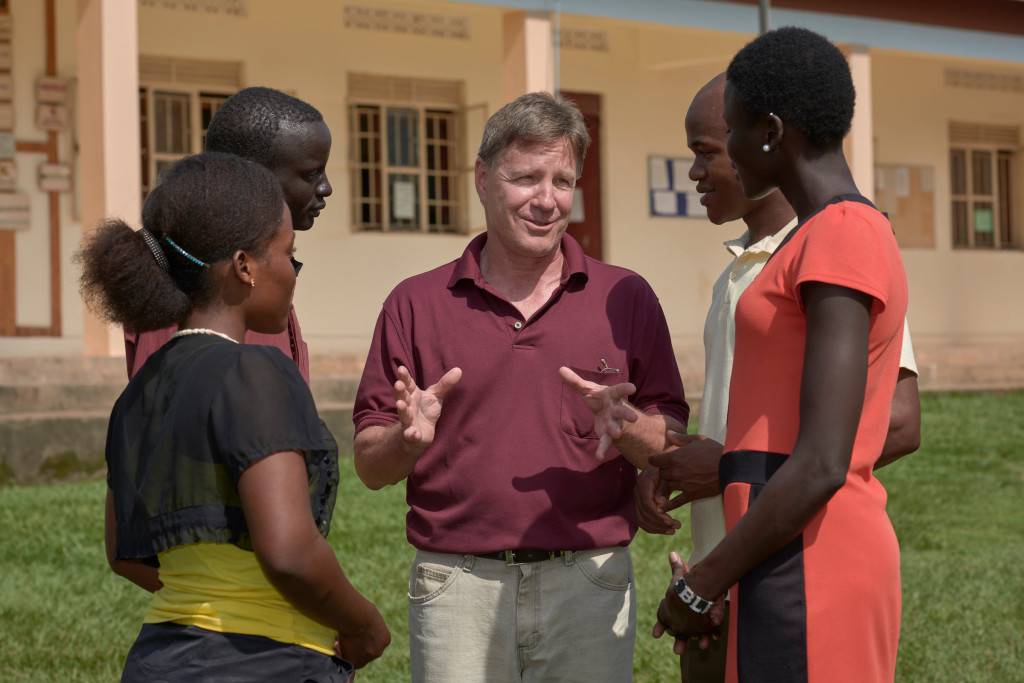
Gabe Hurrish talks with students in the Solidarity Teacher Training College. Photo by Paul Jeffrey.
With regard to the many challenges our student teachers face when they go out to local schools on their four-week teaching practice, one should remember that this is taking place in Yambio, the capital city of Gbudue State. You have to figure that things are even worse in the surrounding countryside.
As I walk around the STTC campus, my mind wanders to the future of these young students. Will they be able to overcome the incredible odds stacked against them? Maybe one day an STTC alum will be a minister? Why not? Already several graduates are school principals.
As I look at these students hunched over their exams and concentrating so hard, I think this is the future of education in this new country. Seeds have been planted by the Holy Spirit. Now let them grow. By the grace of God, I am privileged to be a part of the foundation that is being built by Solidarity in this country.

